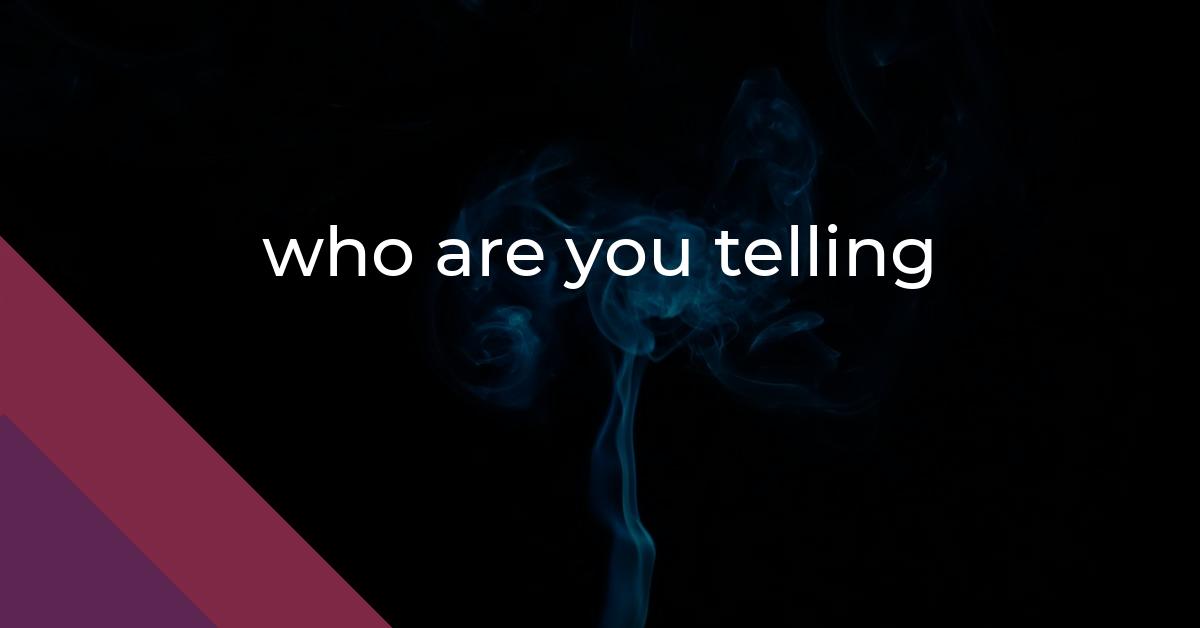who are you telling: Idiom Meaning and Origin
What does ‘who are you telling’ mean?
The idiom "who are you telling" is used to acknowledge someone's statement by expressing agreement or understanding of the information they have shared.

Idiom Explorer
"You're telling me" is an idiomatic expression used to emphasize that the speaker already knows or agrees with what has been said. It is often used sarcastically or to show agreement with a statement that is obvious or well-known.
The idiom "who wants to know" is used to show indifference or annoyance towards someone who is prying or asking for unnecessary information.
The idiom "who's who" refers to a select group of individuals who are considered the most important or influential in a particular field or community.
The idiom "who's 'she', the cat's mother" is a dismissive phrase used to scold someone for referring to a woman as "she" instead of using her name. It conveys the importance of addressing people by their proper names rather than using generic terms.
The idiom "which way the wind is blowing" means to be aware of current trends or popular opinions in order to adapt or make decisions accordingly.
"When it comes to" is an idiom often used to introduce a topic or to indicate what someone is knowledgeable/experienced in. It implies the focus of discussion or expertise on a particular subject matter.
The idiom "what's what" means to understand or know the important or essential information about a subject or situation.
The idiom "what someone said" refers to the exact words or statements expressed by a person. It emphasizes the importance of accurately conveying someone's speech or quoting them directly.
The idiom "what's new" is used as a casual way of asking for the latest or most recent information or updates about someone or something.
The idiom "what's going on" is used to inquire about the current situation or events, seeking information or understanding. It's a casual expression commonly used in conversations to ask about what is happening or to express confusion.
Unveiling the Mysterious Message
I'm telling you, the idiom "who are you telling" is a powerful tool in everyday conversation. It allows us to establish a connection and empathize with others by acknowledging that we have experienced or heard similar things before.
When someone says "who are you telling," they are essentially saying "you're telling me something I already know." It's a way to express solidarity and understanding, reinforcing the bond between the speaker and the listener.
I tell you, this idiom is commonly used in informal settings such as conversations among friends and family. It helps to strengthen social bonds and foster a sense of camaraderie. However, it's important to note that it may not be appropriate for formal or professional settings.
Now, let me tell you more about the idiom "who are you telling." It's a shortened and informal version of the longer phrase "who are you telling that to." This shorter version is more commonly used in everyday speech as it provides a quick and succinct way of acknowledging and validating someone's shared information or experience.
"I'm telling you, this idiom is a powerful expression of empathy. It allows us to connect with others on a deeper level by recognizing and understanding their experiences. By saying "who are you telling," we are letting them know that we have been there too, that we understand what they're going through.
You're telling me, the use of this idiom can also be seen as a rhetorical question. It implies that the speaker already knows or has heard about the information being shared, and therefore, there is no need for the person to explain further or provide additional details.
It's fascinating how language and expressions like "who are you telling" can create such a strong sense of connection and understanding. It's like a secret language that allows us to communicate our shared experiences without the need for lengthy explanations or formalities.
Let me tell you a story. Once, I was sitting with a group of friends, and one of them started talking about a funny incident that happened earlier in the day. As he shared the details, another friend interrupted and said, "who are you telling, the same thing happened to me yesterday!" The room erupted in laughter, and suddenly, we all felt a sense of camaraderie and connection. It was as if we were saying, "we've been there too, we understand, and we're in this together."
I'll tell you, the power of the idiom "who are you telling" lies in its ability to create a shared experience and understanding. It's a reminder that we're not alone in our experiences, that there are others who have faced similar situations and can relate to what we're going through.
Using idioms like "who are you telling" adds flavor and depth to our conversations. They break the monotony of formal language and allow us to express ourselves in a more casual and relatable way. They give our words a personal touch, making communication more engaging and enjoyable.
So, the next time someone shares something with you, try using the idiom "who are you telling" to acknowledge and validate their experience. It's a simple phrase that can make a big difference in creating a stronger connection and fostering a sense of camaraderie. Trust me, you'll see the impact it can have.
Example usage
The idiom "who are you telling" can be used in various sentences to indicate that the speaker is already aware of the information being shared with them. Here are three examples:
- Example 1: A friend excitedly tells you about a great new restaurant in town, but you had already dined there last night. You respond, "Who are you telling? I had dinner there yesterday, and it was amazing!" In this scenario, the idiom is used to express that you are already aware of the information being conveyed.
- Example 2: Your sibling comes home and informs you about a surprise party being organized for your parents. However, you have been involved in planning the event and say, "Who are you telling? I've been helping with the party arrangements for weeks!" Here, the idiom is employed to convey that you are already familiar with the information shared.
- Example 3: Your coworker excitedly tells you about a vacation deal they just found. However, you had already booked that exact same trip last week. You reply, "Who are you telling? I've already booked that vacation! We might even end up on the same flight!" This instance showcases the use of the idiom to express that you are already aware of the information being presented.
More "inform" idioms
We missed the mark - nothing found.



